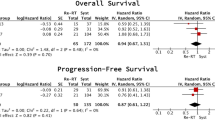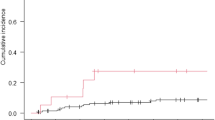Abstract
We evaluated the results of stereotactic radiosurgery (SRS) alone using gamma knife (GK) for selected patients with 1–10 brain metastases without prophylactic whole-brain radiation therapy (WBRT) among JLGK0901-eligible cases. Seven hundred seventy-eight consecutive cases meeting the following JLGK0901 study inclusion criteria were analyzed: (1) newly diagnosed brain metastases, (2) 1–10 brain lesions, (3) less than 10 cm3 volume of the largest tumor, (4) less than 15 cm3 total tumor volume, (5) no magnetic resonance (MR) findings of cerebrospinal fluid (CSF) dissemination, and (6) no impaired activity of daily living [<70 Karnofsky Performance Score (KPS)] due to extracranial disease. At initial treatment, all lesions were irradiated with SRS without upfront WBRT. Thereafter, enhanced magnetic resonance imaging (MRI) was applied every 2–3 months, and new distant lesions were appropriately retreated with SRS or WBRT. We divided patients according to tumor number: single lesion for group A (280 cases), 2 for group B (135), 3–4 for group C (148), 5–6 for group D (93), and 7–10 for group E (122). Differences among groups were compared in terms of overall, neurological, qualitative, and new-lesion-free survival (NLFS). Median age was 65 years (range 26–92 years). There were 505 men and 273 women. The primary organ was lung in 579 patients, gastrointestinal tract in 79, breast in 48, urinary tract in 34, and others/unknown in 38. Mean survival time was 0.72 years (0.83 years for 1, 0.69 years for 2, 0.69 years for 3–4, 0.59 years for 5–6, and 0.62 years for 7–10 metastases). On multivariate analysis, significant poor prognostic factors for overall survival (OS) were active systemic disease, poor (<70) initial KPS, and male gender. Neurological survival and qualitative survival at 1 year were 92.7% and 88.2%, respectively. NLFS at 6 months and 1 year were 69.8% and 43.8%, respectively. There were statistically significant differences in new lesion emergence between groups A and B and between groups B and C. SRS using GK provides excellent results in selected patients with 1–10 brain lesions, without prophylactic WBRT. This study revealed that brain lesion number has no effect on any of the four types of survivals, which is anticipated to be confirmed by the JLGK0901 study.






Similar content being viewed by others
References
Aoyama H, Shirato H, Tago M, Nakagawara K, Toyoda T, Hatano Kenjo M, Oya N, Hirota S, Shioura H, Kunieda E, Inomata T, Hayakawa K, Katoh N, Kobayashi (2006) Stereotactic radiosurgery plus whole brain radiation therapy vs stereotactic radiosurgery alone for treatment of brain metastases: a randomized controlled trial. JAMA 295(21):20535–20536
Patchell RA, Tibbs PA, Walsh JW, Dempsey RJ, Maruyama Y, Kryscio RJ, Markesbery WR, Macdonald JS, Young B (1990) A randomized trial of surgery in the treatment of single metastases to the brain. N Engl J Med 322:494–500
Gaspar L, Scott C, Rotman M, Asbell S, Phillips T, Wasserman T, Mc Kenna WG, Byhardt R (1997) Recursive partitioning analysis (RPA) of prognostic factors in three Radiation Therapy Oncology Group (RTOG) brain metastases trials. Int J Radiat Oncol Biol Phys 37:745–751
Serizawa T, Iuchi T, Ono J, Saeki N, Osato K, Odaki M, Ushikubo O, Sato M, Matsuda S (2000) Gamma knife treatment for multiple metastatic brain tumors compared with whole-brain radiation therapy. J Neurosurg 93(Suppl 3):32–36
Serizawa T, Ono J, Iuchi T, Matsuda S, Sato M, Odaki M, Hirai S, Sato K, Yamaura A (2002) Gamma knife radiosurgery for metastatic brain tumors from lung cancer. Comparison between small cell cancer and non-small cell cancer. J Neurosurg 97(Suppl 5):484–488
Serizawa T, Saeki N, Higuchi Y, Ono J, Iuchi T, Nagano O, Yamaura A (2005) Gamma knife surgery for brain metastases: indications for and limitations of a local treatment protocol. Acta Neurochir (Wien) 147:721–726
Serizawa T, Higuchi Y, Ono J, Matsuda S, Iuchi T, Nagano O, Saeki N (2006) Gamma knife surgery for metastatic brain tumors from lung cancer without prophylactic whole brain radiation therapy. In: Kondziolka D (ed) Radiosurgery. Karger, Basel, Switzerland, pp 186–198
Serizawa T, Higuchi Y, Ono J, Matsuda S, Nagano O, Iwadate Y, Saeki N (2006) Gamma knife surgery for metastatic brain tumor without prophylactic whole brain radiation therapy: results in 1000 consecutive cases. J Neurosurg 105:86–90
Serizawa T, Yamamoto M, Nagano O, Higuchi Y, Matsuda S, Ono J, Iwadate Y, Saeki N (2008) Gamma knife surgery for metastatic brain tumors. A 2-institute study in Japan. J Neurosurg 109:118–121
Serizawa T (2008) Metastatic brain tumors: lung cancer. In: Yamamoto M (ed) Japanese experience with gamma knife radiosurgery. Karger, Basel, Switzerland, pp 142–153
Yang CC, Ting J, Wu X, Markoe A (1998) Dose volume histogram analysis of gamma knife radiosurgery treating twenty-five metastatic intracranial tumors. Stereotactic Funct Neurosurg 70:41–49
Yamamoto M, Ide M, Nishio S, Urakawa Y (2002) Gamma knife radiosurgery for numerous brain metastases: is this a safe treatment? Int J Radiat Oncol Biol Phys 53(5):1279–1283
Schoenfeld DA, Richter JR (1982) Nomograms for calculating the number of patients needed for a clinical trial with survival as an endpoint. Biometrics 38(1):163–170
Author information
Authors and Affiliations
Corresponding author
Rights and permissions
About this article
Cite this article
Serizawa, T., Hirai, T., Nagano, O. et al. Gamma knife surgery for 1–10 brain metastases without prophylactic whole-brain radiation therapy: analysis of cases meeting the Japanese prospective multi-institute study (JLGK0901) inclusion criteria. J Neurooncol 98, 163–167 (2010). https://doi.org/10.1007/s11060-010-0169-x
Received:
Accepted:
Published:
Issue Date:
DOI: https://doi.org/10.1007/s11060-010-0169-x




